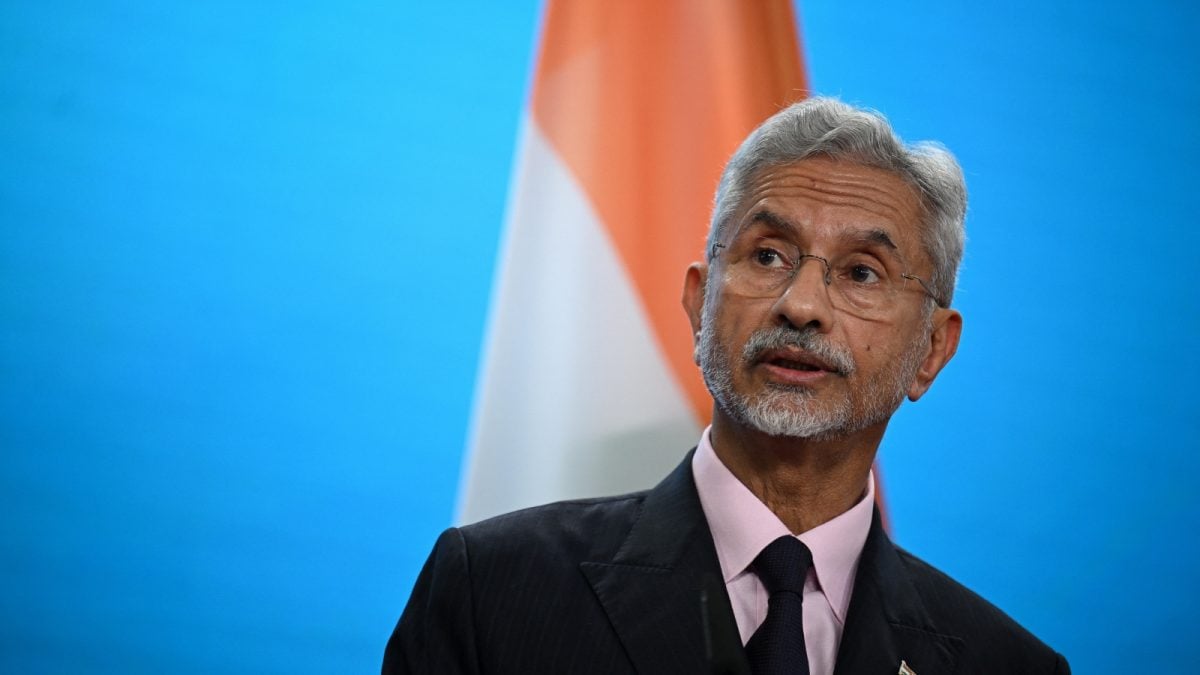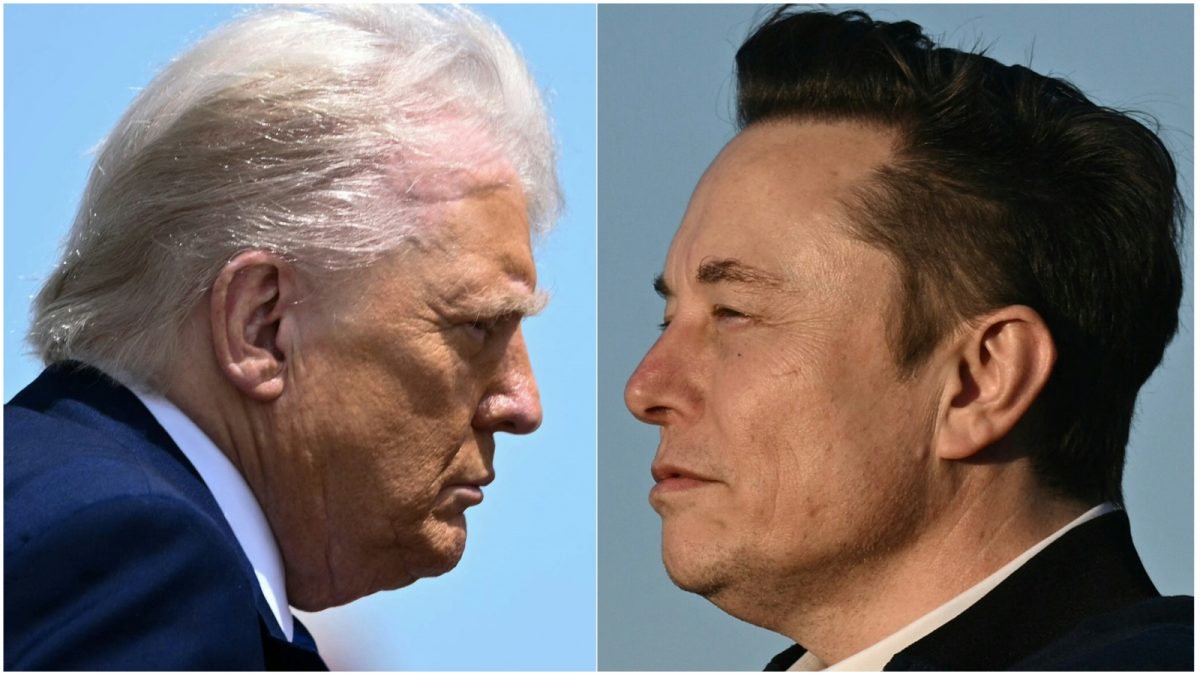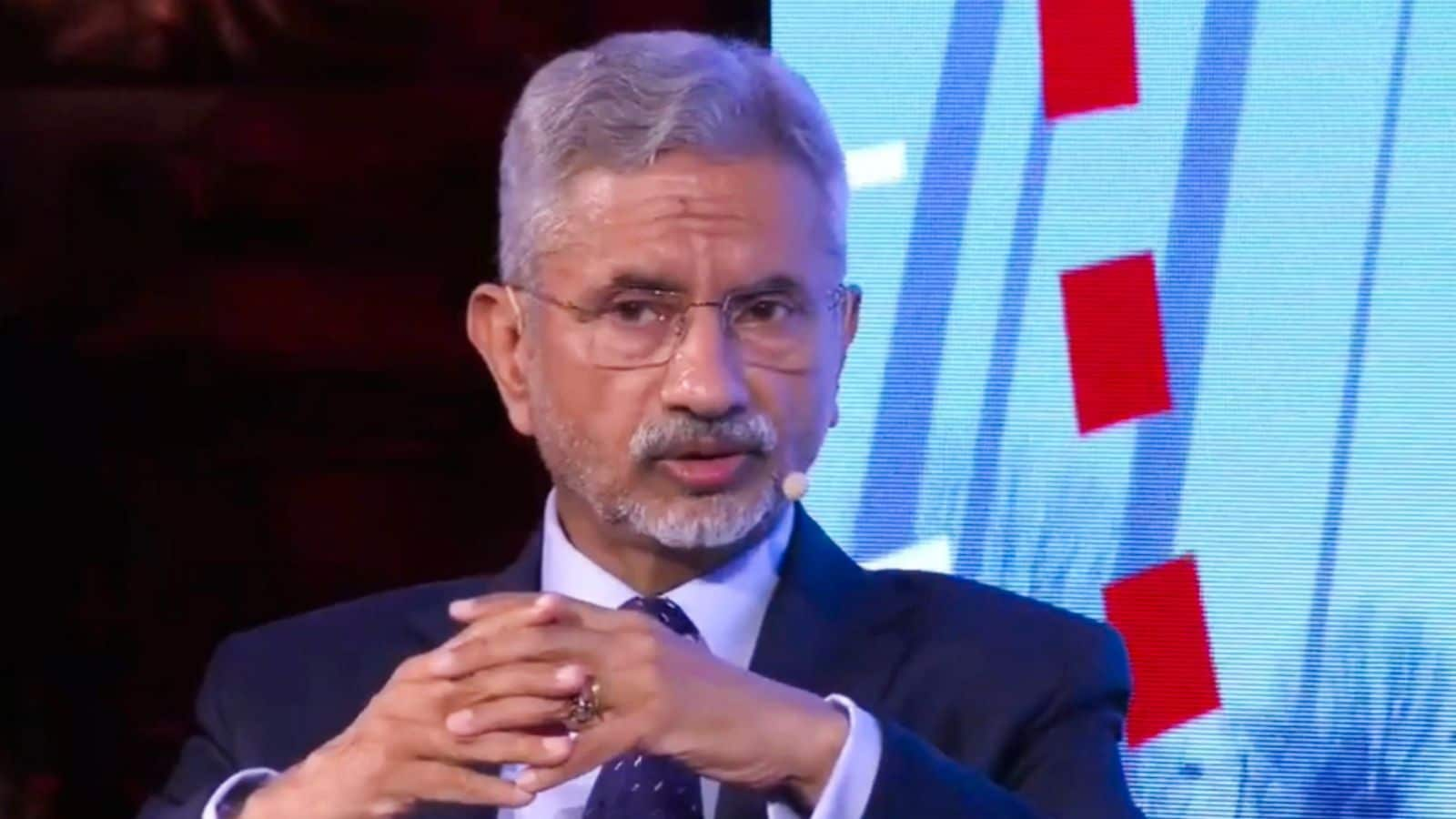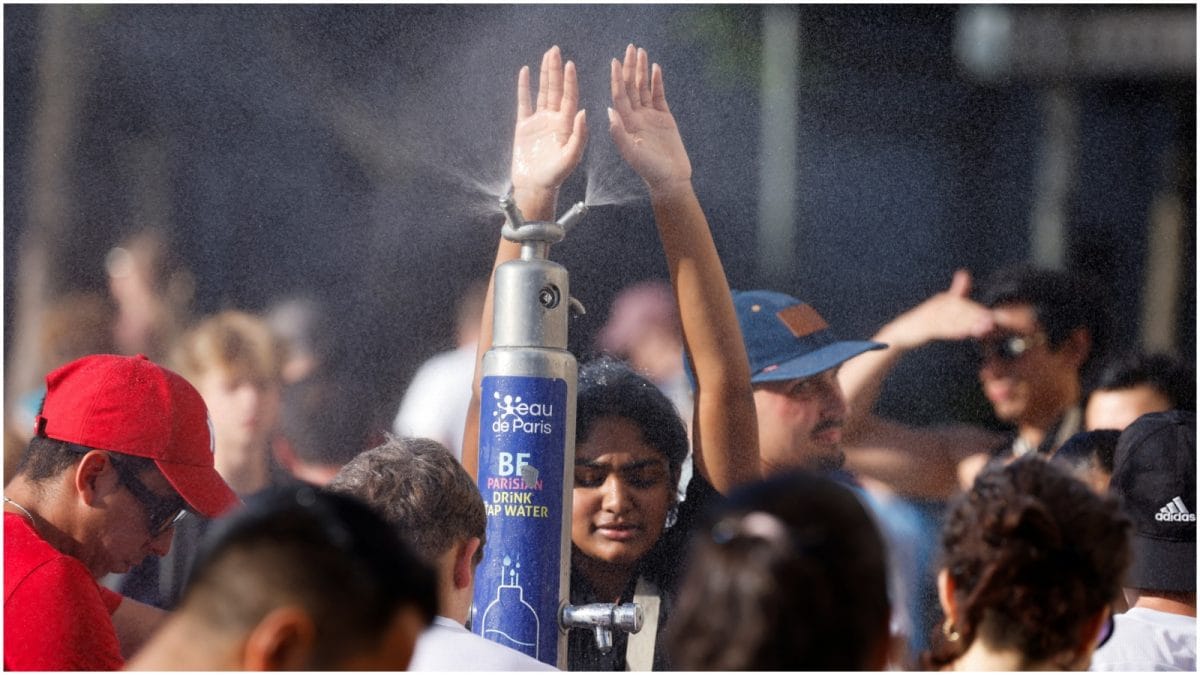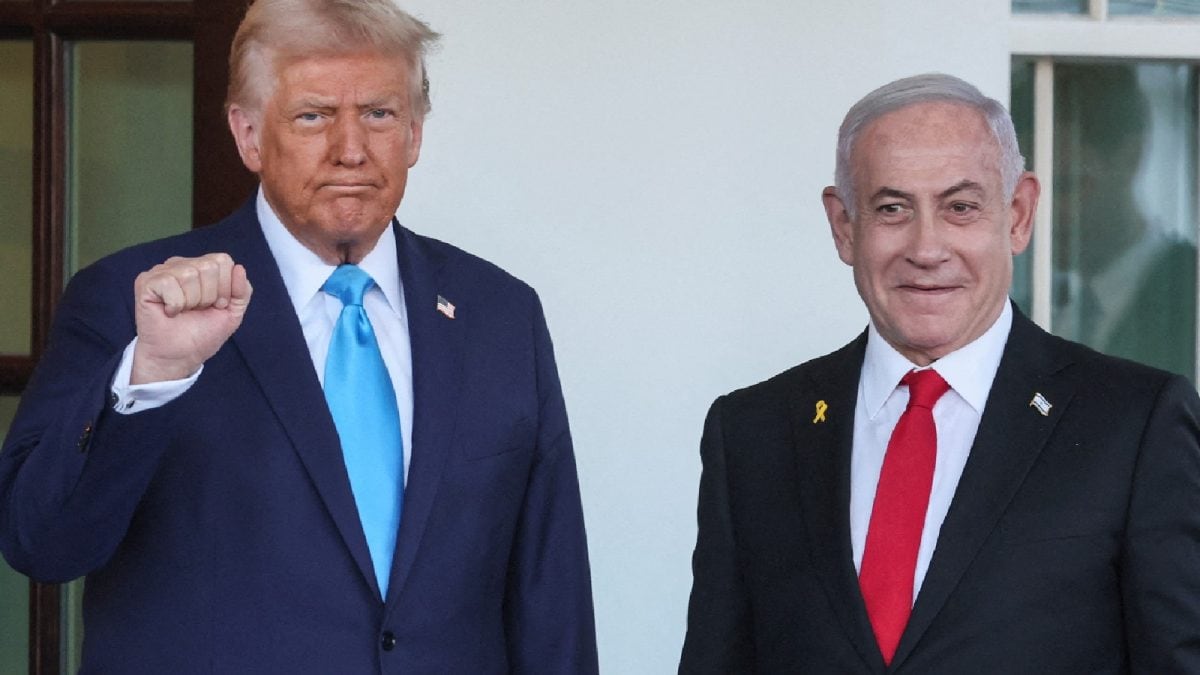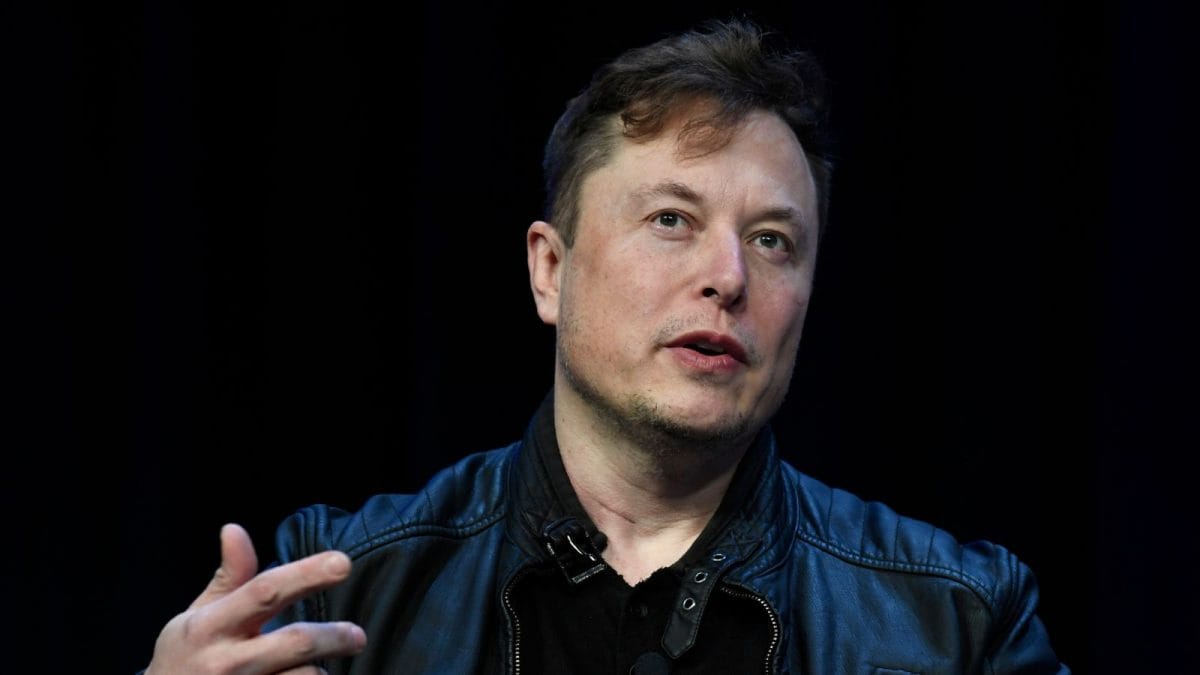UN warns 14,000 babies could die in Gaza in next 48 hours without aid
The UN’s humanitarian chief, Tom Fletcher, has been speaking to the BBC’s Radio 4’s Today’s programme about the dismal amount of aid Israel is letting into Gaza.
pressure over a looming famine forced Benjamin Netanyahu to announce on Sunday night that he would ease the devastating 11-week aid blockade to prevent a “starvation crisis” in Gaza – but only to a minimum level.
Fletcher said five trucks of aid went into Gaza yesterday, but described this as a “drop in the ocean” and totally inadequate for the population’s needs.
He said the aid lorries, which contain baby food and nutrition, are technically in Gaza but have not reached civilians as they are just on the other side of the border.
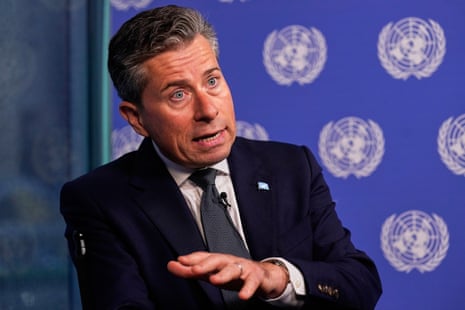
Fletcher said 14,000 babies could die in 48 hours if aid doesn’t reach them in time.
“I want to save as many as these 14,000 babies as we can in the next 48 hours,” he told the BBC.
Asked how the UN arrived at this figure, he responded: “We have strong teams on the ground - and of course many of them have been killed… we he still have lots of people on the ground - they’re at the medical centres, they’re at the schools...trying to assess needs.”

Key events Show key events only Please turn on JavaScript to use this feature
'Around 100' aid trucks to be allowed entry into Gaza - UN
As we’ve reported earlier in the blog, the UN’s humanitarian chief, Tom Fletcher, said only five aid trucks were allowed into Gaza yesterday.
The UN has just confirmed it has been given permission to send “around 100” aid trucks into Gaza today (for context: pre-war an average of 500 trucks were entering per day).
Fletcher earlier acknowledged the risks to staff who may be caught in Israeli airstrikes as they try to deliver the supplies.
Charities have warned of a looming famine across Gaza caused by Israel’s food blockade, which was eased yesterday to a bare minimum level only because of fears key allies (i.e. US senators) were distressed by images of “mass hunger” and could pull support over such scenes.

Israel imposed its blockade in early March, cutting off all supplies including food, medicine, shelter and fuel in what has been widely condemned as the collective punishment of the civilian population in Gaza. Israel claimed the blockade was to pressure Hamas into releasing hostages.
Because of the blockade, most community kitchens have now shut down. Vegetables and meat are inaccessible or unaffordable. The World Health Organization said yesterday that two million people were starving in the Gaza Strip while tonnes of food was being blocked at the border.
Al Jazeera is reporting that at least two people were killed by Israeli drone fire in the Tuffah neighbourhood in Gaza City, while two others were killed by Israeli artillery shelling in the Bureij refugee camp in central Gaza.

Jennifer Rankin
Israel has justified its blockade of Gaza by claiming that Hamas steals food from humanitarian agencies and the UN. The Israeli government denies targeting civilians and says it is fighting a war of survival.
EU policy on Israel has typically been hobbled by the difficulties in finding unanimity among 27 member states with different views, from countries that have recognised Palestine, such as Spain and Ireland, to staunch allies of Israeli president Benjamin Netanyahu, such as Hungary and the Czech Republic.
While the EU-Israel can only be suspended by unanimity, key provisions, including on trade and Israel’s participation in Europe’s Horizon research funding programme can be suspended on the basis of a weighted majority vote.
EU foreign ministers to discuss plans to review bloc's relationship with Israel

Jennifer Rankin
Jennifer Rankin is Brussels correspondent for the Guardian
EU foreign ministers will discuss plans to review the bloc’s relationship with Israel, amid growing alarm about the dire humanitarian situation in Gaza and the West Bank.
Arriving at a meeting in Brussels, EU foreign policy chief Kaja Kallas said ministers would discuss a Dutch proposal to review the EU-Israel association agreement, a trade accord signed in 2000.
“It’s going to be a very, very hard discussion on Gaza,” she said, noting that member states took different views in their approach to Israel’s government.
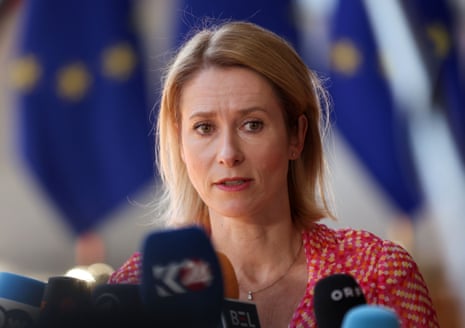
France’s foreign minister Jean-Noël Barrot told local media earlier on Tuesday that Paris backed a review of the EU-Israel agreement to see if Israel was respecting its commitments to human rights.
In a letter to Kallas, Dutch foreign minister Casper Veldkamp said Israel’s aid blockade was a violation of its obligations under international humanitarian law and therefore the EU-Israel agreement, which includes provisions to respect human rights. He also expressed concern about Israel’s plans to entrust the delivery of aid to Palestinians to private companies, rather than the UN and humanitarian organisations.
He wrote:
All of this merits a broader reflection on and discussion of our relationship with Israel.
Ireland’s development minister Neale Richmond told reporters that ten countries now supported the decision to review the agreement, up from only a handful a year ago.
Commenting on the growing momentum to review the agreement, he said:
I can only imagine it’s because other member states have eyes and ears and they can see the absolute horrors that are unfolding on a daily basis live on our television screens in Gaza.
Children are dying, children are starving, families are being murdered every day. This is not acceptable and it’s clearly now time for the EU to look at that EU-Israel trade association and the very clear breaches of the human rights under article 2 [of the agreement].
He called on Kallas to provide “a clear message [that] we won’t stand for the status quo”.
Philippe Lazzarini, the commissioner-general of Unrwa, the UN agency that supports Palestinian refugees, has been speaking to Euronews.
He said US President Donald Trump has the unique power to force Israeli prime minister Benjamin Netanyahu to “change the situation” in Gaza.
Lazzarani told Euronews:
I do believe that President Donald Trump has the necessary influence to change the situation in Gaza and make sure that the siege be lifted and that the population get access to the assistance it deserves.
He added:
It’s an outrage that we are confronted by a situation of starvation when it comes to Gaza. It’s a completely fabricated one. We are in a situation where hunger and food are being weaponised for political and military purposes…
What is needed in Gaza is a massive, unhindered, uninterrupted assistance of supply to make sure that we are reversing the trend of the spreading hunger.

Unrwa has been the major distributor of aid in Gaza and has provided education, health and other basic services to millions of Palestinian refugees across the region.
But an Israeli ban on the agency in Gaza and the occupied West Bank took effect earlier this year as Israel accuses Unrwa of being infiltrated by Hamas, the Palestinian militant group. Unrwa denies this claim.
Palestinian Unrwa personnel in Gaza continue to provide services and assistance to the civilian population and staff do the same in the occupied West Bank, including East Jerusalem.
Sam Jones
Sam Jones is Madrid correspondent for the Guardian
Spain’s socialist prime minister, Pedro Sánchez, has called on Israel to withdraw from the Eurovision song contest, saying it should be held to the same standards over the war in Gaza as Russia has been over the invasion of Ukraine.
“I don’t think anyone put their head in their hands when Russia began its invasion of Ukraine three years ago and people demanded it withdraw from, or not participate in, international competitions - as we’ve seen with Eurovision this weekend,” he said on Monday. “And Israel shouldn’t be participating either, because we can’t allow double standards when it comes to culture, either.”
Sánchez added: “Spain’s commitment to international law must be constant and coherent - and so must Europe’s.”
Ahead of Saturday’s Eurovision final, Spain’s public broadcaster, RTVE, had ignored warnings from Eurovision organisers the European Broadcasting Union, and shown a message before the start of the contest that read: “When human rights are at stake, silence is not an option. Peace and Justice for Palestine.”
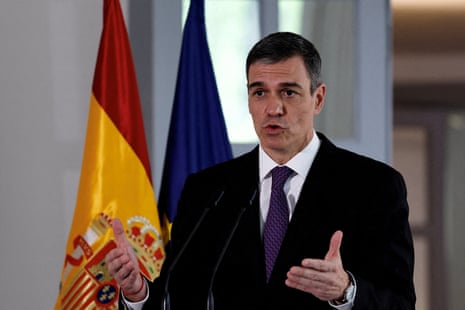
Sánchez has long been one of the most outspoken European critics of Israel’s conduct in Gaza.
Last week, Israel said it had summoned the Spanish ambassador for a formal reprimand after the prime minister described Israel as a “genocidal state”.
Sánchez made the remarks on Wednesday during an exchange in the Spanish parliament in which his government was accused of continuing to trade with Israel. “I want to clarify one thing,” the prime minister said. “We don’t trade with a genocidal state. We don’t.”
At the end of April, Spain scrapped a €6.6m (£5.7m) order for millions of bullets from an Israeli company after the junior partners in Sánchez’s coalition government denounced it as a “flagrant breach” of the alliance agreement that jeopardised the country’s sustained efforts to hold Israel accountable for its actions in Gaza.
The Sánchez administration has frequently clashed with Israel over their view of the war; in 2023 the Israeli government recalled its ambassador to Madrid after Sánchez said he had “genuine doubts” about whether Israel was complying with international humanitarian law in its offensive in Gaza.
Qatar’s prime minister has said Israel’s continuing assault on Gaza has undermined peace efforts.
Speaking at Qatar’s economic forum, Sheikh Mohammed bin Abdulrahman bin Jassim Al-Thani said:
When Israeli American soldier Aidan Alexander was released, we thought that moment would open a door to end this tragedy, but the response was a more violent wave of strikes.
This irresponsible, aggressive behaviour undermines any potential chance for peace.
Qatar is an influential Gulf state and a key US ally in the region. It has been a key mediator in Israel’s war, along with Egypt.
Tom Fletcher went on to tell the BBC that he hopes 100 trucks will enter Gaza today.
“It’ll be tough,” the UN’s humanitarian chief said, explaining how they will face obstacles along the way.
“But we’ll load those up with baby food and our people will run those risks,” he added.
UN warns 14,000 babies could die in Gaza in next 48 hours without aid
The UN’s humanitarian chief, Tom Fletcher, has been speaking to the BBC’s Radio 4’s Today’s programme about the dismal amount of aid Israel is letting into Gaza.
pressure over a looming famine forced Benjamin Netanyahu to announce on Sunday night that he would ease the devastating 11-week aid blockade to prevent a “starvation crisis” in Gaza – but only to a minimum level.
Fletcher said five trucks of aid went into Gaza yesterday, but described this as a “drop in the ocean” and totally inadequate for the population’s needs.
He said the aid lorries, which contain baby food and nutrition, are technically in Gaza but have not reached civilians as they are just on the other side of the border.

Fletcher said 14,000 babies could die in 48 hours if aid doesn’t reach them in time.
“I want to save as many as these 14,000 babies as we can in the next 48 hours,” he told the BBC.
Asked how the UN arrived at this figure, he responded: “We have strong teams on the ground - and of course many of them have been killed… we he still have lots of people on the ground - they’re at the medical centres, they’re at the schools...trying to assess needs.”

Why is the US continuing to back Israel despite starvation claims and renewed assault on Gaza?
As key western allies demand Israel change course in its assault on Gaza, the US, Israel’s biggest arms supplier, remains largely unmoved.
Here is an extract from a story by my colleague Joseph Gedeon, who explains why Washington’s support for Benjamin Netanyahu is so solid despite the increasing international pressure.
Despite Israeli promises to “flatten” Gaza, opposition from Congress – and mainstream Democrats more broadly – has been largely muted. While the besieged territory faces what the World Health Organization (Who) calls “one of the world’s worst hunger crises”, more than three dozen members of Congress from both parties recently appeared in an American Israel Public Affairs Committee (Aipac) video in celebration of Israel’s 77th birthday. In New York, leading mayoral candidate Andrew Cuomo held up an Israeli flag in the city’s annual Israel Day Parade on Sunday.
This political genuflection comes as a March Gallup poll shows American support for Israel has dropped to 46% – its lowest point in 25 years – while sympathy for Palestinians has risen to a record 33%. Democrats reported sympathizing with Palestinians over Israelis by a three-to-one ratio.
On a recent episode of The Late Show with Stephen Colbert, Senator Bernie Sanders blamed Washington’s reluctance to change course on the financial muscle of lobbying groups. “If you speak up on that issue, you’ll have super Pacs like Aipac going after you,” Sanders said, noting Aipac’s record $14.5m campaign to unseat Democratic representative Jamaal Bowman after he accused Israel of genocide.
You can read the full analysis here:
As we mentioned in the opening post, the UK, France and Canada issued a rare joint condemnation of Israel, denouncing its expanded offensive in Gaza and the blocking of aid into the territory.
It marks a change in tone from the UK and Canada - in particular – which have broadly backed Israel’s war and insisted on its “right to defend” itself following the 7 October Hamas-led attack on southern Israel, in which about 1,200 people were killed and 250 taken hostage.
This is despite Israel being accused of committing genocide and carrying out widespread and systematic violations of international law. France has been more openly critical of the Israeli military’s conduct.
All three countries have called for more humanitarian aid to be let into the Strip, for the return of hostages and an end to the fighting but strong, coordinated diplomatic pressure has not been put on the Netanyahu government.
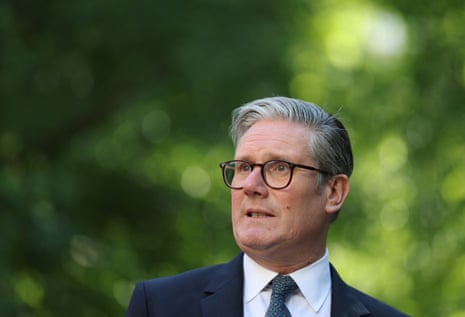
Last year, the UK government suspended some arms sales to Israel (affecting equipment such as parts for fighter jets, helicopters and drones), saying there was a “clear risk” the equipment could be used to commit serious violations of international law.
But ministers gave a carve out for the supply of UK components to the global pool of F-35 jets, saying such disruption to the entire F-35 programme would be a threat to Nato’s peace and security.
Canada stopped approving permits for arms exports to Israel last year, but its global affairs ministry had exported military goods and technology to Israel before this.
Israeli airstrikes have killed 44 Palestinian people so far today, Gaza rescuers say
Gaza’s civil defence agency said in its latest update that Israeli airstrikes have killed at least 44 Palestinian people in Gaza so far today.
“Civil defence teams have transferred (to hospitals) at least 44 dead, mostly children and women, as well as dozens of wounded” across Gaza since 1:00 am (2200 GMT Monday), agency spokesperson Mahmud Bassal told the Agence France-Presse (AFP) news agency.
Bassal said eight Palestinian people were killed in an Israeli airstrike on a school sheltering displaced people in Gaza City and 12 other people in an airstrike on a house in Deir el-Balah in central Gaza.
Another 15 Palestinian people were killed in an Israeli airstrike on a gas station near the Nuseirat refugee camp and nine others in an airstrike on a house in the Jabalia refugee camp.
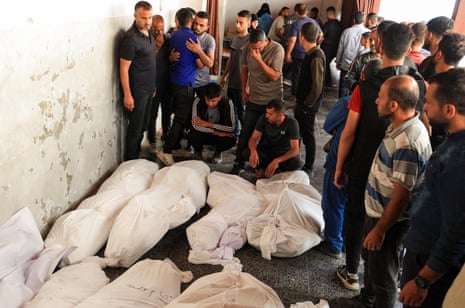
First aid trucks trickle into Gaza after months of Israeli blockade
The first few aid trucks entered Gaza on Monday after nearly three months of Israel’s blockade of food, medicine and other supplies, Israel and the UN said.
Five trucks carrying baby food and other desperately needed aid entered the territory of more than 2 million Palestinians via the Kerem Shalom crossing, according to the Israeli defence body in charge of coordinating aid to Gaza, Cogat.
The UN humanitarian chief, Tom Fletcher, called it a “welcome development” but described the trucks as a “drop in the ocean of what is urgently needed”.
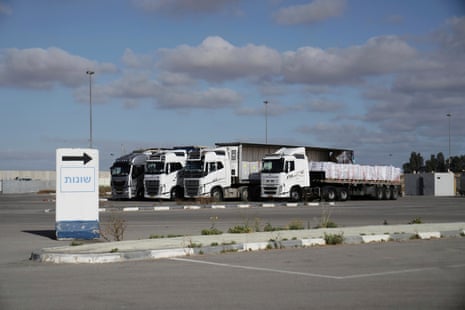
Food security experts last week warned of famine in Gaza. During the latest ceasefire that Israel shattered in March with a wave of deadly airstrikes, about 600 aid trucks entered Gaza each day.
Fletcher said an additional four UN trucks were cleared to enter Gaza. Those trucks may enter Tuesday, Cogat said. Fletcher added that given the chaotic situation on the ground, the UN expects the aid could be looted or stolen, a growing problem as resources became increasingly scarce.
Benjamin Netanyahu said his decision to resume “minimal” aid to Gaza came after allies said they couldn’t support Israel’s expansion of its assault if there were “images of hunger” coming from the Palestinian territory.
Netanyahu hits back after UK, France and Canada threaten action against Israel
Welcome to our continuing live coverage of the developments in the Middle East and Israel’s war on Gaza
The leaders of the UK, France and Canada on Monday condemned Israel’s “egregious actions” in Gaza and warned of joint action if Israel did not stop its military offensive.
But Israel’s prime minister, Benjamin Netanyahu, hit back at British prime minister Keir Starmer, French president Emmanuel Macron and Canadian prime minister Mark Carney, saying their joint statement was a “huge prize” for Hamas in the war.
Starmer, Macron and Carney criticised Israel’s blocking of aid and comments by ministers in Netanyahu’s government who have threatened the mass displacement of Palestinians.
“We will not stand by while the Netanyahu government pursues these egregious actions,” the leaders said. “If Israel does not cease the renewed military offensive and lift its restrictions on humanitarian aid, we will take further concrete actions in response.”
Netanyahu gave a furious response in a statement released by his office.
“By asking Israel to end a defensive war for our survival before Hamas terrorists on our border are destroyed and by demanding a Palestinian state, the leaders in London, Ottawa and Paris are offering a huge prize for the genocidal attack on Israel on October 7 while inviting more such atrocities,” he said, referring to the Hamas attacks in 2023 that set off the war.
Netanyahu said “all European leaders” should follow US president Donald Trump’s example in supporting Israel.
“The war can end tomorrow if the remaining hostages are released, Hamas lays down its arms, its murderous leaders are exiled and Gaza is demilitarised. No nation can be expected to accept anything less and Israel certainly won’t,” Netanyahu declared.
“This is a war of civilisation over barbarism. Israel will continue to defend itself by just means until total victory is achieved.”
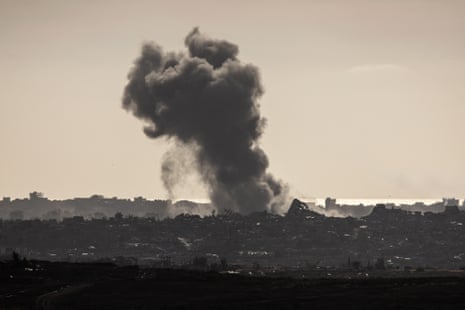

 1 month ago
1 month ago
